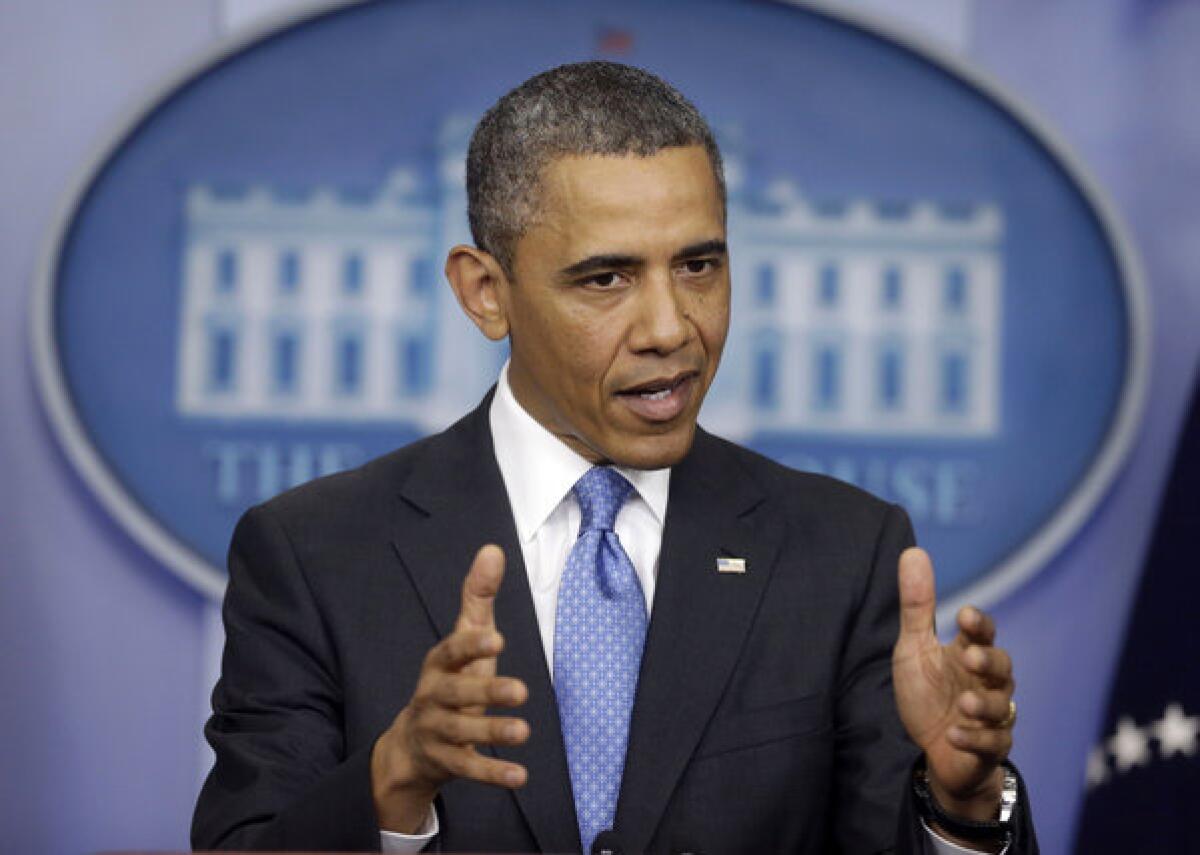Activists urge Obama to speak out on Mexico’s human rights record

MEXICO CITY -- Activists are attempting to spotlight human rights issues during President Obama’s visit this week to Mexico, urging him to publicly condemn what they describe as Mexico’s abysmal record of torture, killings and forced disappearances by security forces.
It is highly unlikely Obama would make that kind of public statement during his stay here Thursday and Friday. His meetings with Mexico’s new president, Enrique Peña Nieto, are expected to focus on topics the two governments prefer, such as the economy and trade, with a nod to security and the drug war.
Any discussion of human rights issues would probably occur behind closed doors.
Rights organizations say Obama is missing an opportunity to criticize Mexico’s record at a time when Peña Nieto can avoid being blamed for it. He assumed the presidency just five months ago, at the end of President Felipe Calderon’s six-year term.
Under Calderon, the government fought powerful drug cartels and arrested key criminal figures. But killings, kidnappings and other severe human rights abuses by the police and military soared, according to human rights groups, as well as testimony collected by The Times. During that period, the Obama administration repeatedly voiced its support for Calderon’s efforts.
“Presidents Obama and Peña Nieto have a golden opportunity to address issues affecting the lives of people on both sides of the border,” Frank Jannuzi, interim executive director of Amnesty International USA, said in a statement Tuesday.
“Respecting human rights must be integral to any joint plan for further bilateral cooperation between the two countries -- not just words during a presidential photo-op,” he added. “Do not squander this moment.”
Jose Miguel Vivanco, director of the Americas program at the New York-based Human Rights Watch group, wrote to Obama this week to chastise the administration for its “uncritical” support of Calderon’s policies and failure to condemn abuses.
“This visit provides an ideal opportunity to break that silence by demonstrating the U.S. government’s concern for Mexico’s human rights problems and [the new government’s] commitment to supporting a new approach,” Vivanco wrote.
He noted that Peña Nieto’s administration has said that it would “adjust” the drug-war strategy.
Current and former officials from Mexico and the United States told The Times last week that one of those adjustments will be to reduce the role U.S. advisors play in Mexico’s security affairs.
Obama on Friday travels from Mexico to Costa Rica, where he will meet with several Central American leaders. With that in mind, a coalition of human rights groups from the region urged the leaders Tuesday to confront the abuses faced by thousands of Central Americans who travel across Mexico every year in an effort to reach the U.S.
Many from Guatemala, Honduras and El Salvador, especially, are kidnapped by criminal drug-and-extortion gangs -- often working in cahoots with Mexican police -- and held for ransom, forced into slave labor or killed.
In a letter to Obama, Peña Nieto and the presidents of Central America, 145 organizations said the “alarming increase in violence” had to stop. They blamed transnational criminal gangs, but also the “failed security policies” of the region’s government that have “militarized citizen security” and “exacerbated … human suffering.”
In Mexico and through most of Central America, armies have been given large roles in fighting drug traffickers, often with the U.S. military as close advisors.
Another group of activists in Mexico City chose arms trafficking as their issue. They sent a small dirigible over the city Monday to symbolically deliver to the U.S. Embassy a petition calling for an end to the steady flow of weapons into Mexico from the United States. The slogan “Adios a las armas” (Goodbye to weapons) was printed on the side of the dirigible.
Apparently, however, a stiff wind sent the balloon off course, and it crashed somewhere over the western part of the city.
Organizers decided instead to carry their petition, which they said had collected about 20,000 signatures via the Internet, to the embassy in person.
“Without stopping the weapons,” prominent peace activist and poet Javier Sicilia said, “we cannot stop this horror that Mexico is living.”
ALSO:
Obama’s ‘red line’ on Syria grows softer
Six men plead guilty in Britain to planning terror attack
Dutch get a new monarch: Willem-Alexander succeeds Beatrix
More to Read
Sign up for Essential California
The most important California stories and recommendations in your inbox every morning.
You may occasionally receive promotional content from the Los Angeles Times.











